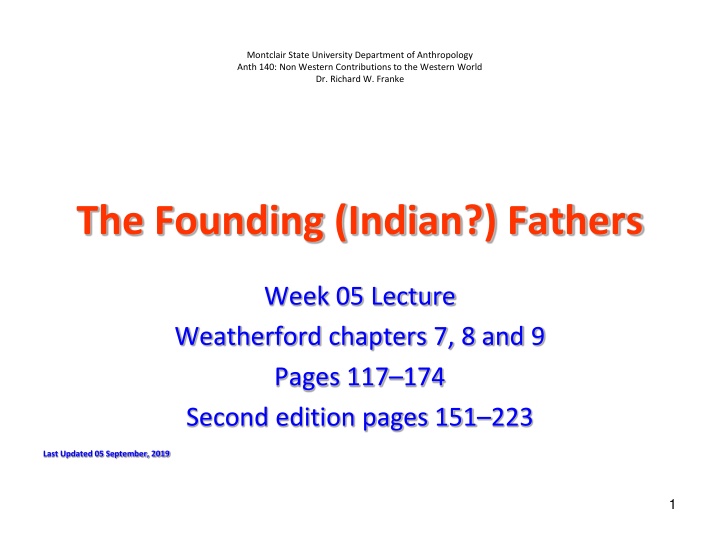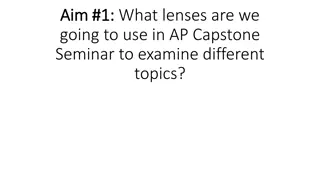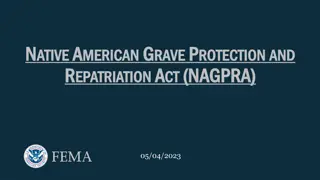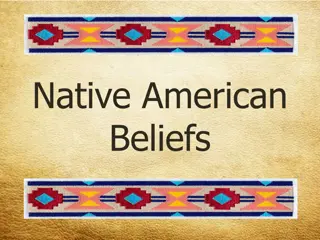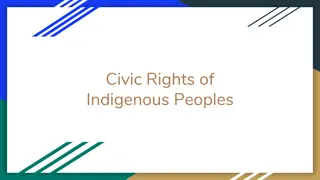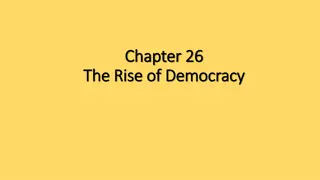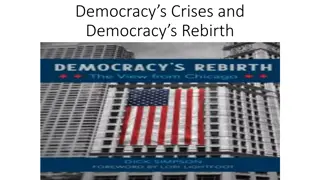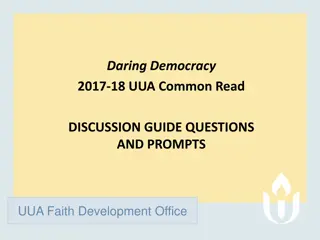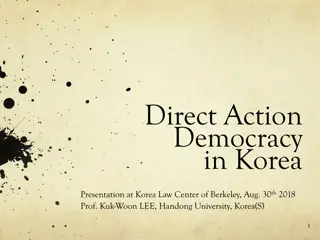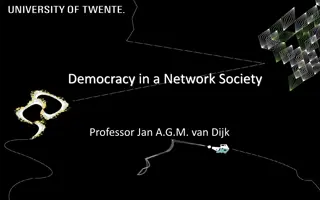Native American Contributions to American Democracy
the influence of Native Americans on American democracy through historical accounts and debates about their impact on the development of democratic principles in the United States. Sources from notable historians shed light on the role of Native American tribes, particularly the Iroquois, in shaping key aspects of American governance.
Download Presentation

Please find below an Image/Link to download the presentation.
The content on the website is provided AS IS for your information and personal use only. It may not be sold, licensed, or shared on other websites without obtaining consent from the author.If you encounter any issues during the download, it is possible that the publisher has removed the file from their server.
You are allowed to download the files provided on this website for personal or commercial use, subject to the condition that they are used lawfully. All files are the property of their respective owners.
The content on the website is provided AS IS for your information and personal use only. It may not be sold, licensed, or shared on other websites without obtaining consent from the author.
E N D
Presentation Transcript
Montclair State University Department of Anthropology Anth 140: Non Western Contributions to the Western World Dr. Richard W. Franke The Founding (Indian?) Fathers Week 05 Lecture Weatherford chapters 7, 8 and 9 Pages 117 174 Second edition pages 151 223 Last Updated 05 September, 2019 1
Montclair State University Department of Anthropology Anth 140: Non Western Contributions to the Western World Dr. Richard W. Franke The Founding (Indian) Fathers? Native American Contributions to American Democracy The learning objectives for week 05 are: to take the first exam and to critically evaluate the pros and cons of the debate about the influence of Native Americans on the development of democracy in the United States 2
Montclair State University Department of Anthropology Anth 140: Non Western Contributions to the Western World Dr. Richard W. Franke Native American Contributions to American Democracy Terms you should know for week 05 are: anarchy/anarchism Nambicuara Thomas Paine Jean Jacques Rousseau League of the Iroquois Seneca Falls, New York 19th Amendment to the US Constitution (1920) 3
Montclair State University Department of Anthropology Anth 140: Non Western Contributions to the Western World: Dr. Richard W. Franke Native American Contributions to American Democracy Week 05 Sources: Grinde, Donald A., Jr. 1977. The Iroquois and the Founding of the American Nation. San Francisco: The Indian Historian Press. A Yamasee Native American historian s account of the role of the Iroquois constitution in shaping American settler concepts of democracy and the American constitution. Includes a complete English text of The Council of the Great Peace of Dekanawidah. Wagner, Sally Roesch. 1996. The Untold Story of the Iroquois Influence on Early Feminists. Aberdeen, South Dakota: Sky Carrier Press Zinn, Howard. 1995. A People s History of the United States: 1492 Present. New York: Harper/Perennial. Esp. pages 102 23. A debate about Grinde's work and that of colleague Bruce Johansen, appears in the following three sources (thanks to MSU History Prof. Robert Cray for these citations): Levy, Philip. 1996. Exemplars of taking liberties: the Iroquois influence thesis and the problem of evidence. The William and Mary Quarterly, 3rd Series, 53(3):588 604. Payne, Samuel B. Jr. 1996. The Iroquois League, the Articles of Confederation, and the Constitution. The William and Mary Quarterly, 3rd Series, 53(3):605 20. Grinde, Donald A. Jr. and Bruce E. Johansen. 1996. Sauce for the goose: demand and definitions for "proof" regarding the Iroquois and democracy. The William and Mary Quarterly, 3rd Series, 53(3):621 35. 4
Montclair State University Department of Anthropology Anth 140: Non Western Contributions to the Western World Dr. Richard W. Franke To an outsider powwows often appear chaotic No one is in control This seems to be typical of Indian community events leaders can only lead by example the event unfolds as a collective activity of all the participants. Weatherford, page 120; second edition page 155 5
Montclair State University Department of Anthropology Anth 140: Non Western Contributions to the Western World Dr. Richard W. Franke Indian penchant for respectful individualism first explorers wrote about it five centuries ago. Indian societies operated without coercive political institutions. 6
Montclair State University Department of Anthropology Anth 140: Non Western Contributions to the Western World Dr. Richard W. Franke Two basic concepts of freedom: National independence and sovereignty Personal liberty Personal liberty version does not have a long pedigree in the Old World. Weatherrford, page 121; second edition page 156 7
Montclair State University Department of Anthropology Anth 140: Non Western Contributions to the Western World Dr. Richard W. Franke Powwow observations introduce Weatherford s two part theory of Native American influences on the modern concept of democracy: Indirect (ideological) influences: widely accepted Direct (technical) influences on US constitution and the structure and practices of the US government: hotly debated 8
Montclair State University Department of Anthropology Anth 140: Non Western Contributions to the Western World Dr. Richard W. Franke First examine the indirect (ideological) influences that are widely accepted 9
Montclair State University Department of Anthropology Anth 140: Non Western Contributions to the Western World Dr. Richard W. Franke The American Revolution was heavily based on the ideas of the philosophical and intellectual historical period known as The Enlightenment, but 10
Montclair State University Department of Anthropology Anth 140: Non Western Contributions to the Western World Dr. Richard W. Franke Egalitarian democracy and liberty as we know them today owe little to Europe. They are not Greco-Roman derivatives somehow revived by the French in the 18th Century. They entered modern western thought as American Indian notions translated into European language and culture. (Weatherford page 128;second edition page 166) 11
Montclair State University Department of Anthropology Anth 140: Non Western Contributions to the Western World Dr. Richard W. Franke The Enlightenment from about 1720 1790 Grew out of the Renaissance Especially important in France and England Widespread criticism of traditions of middle ages 12
Montclair State University Department of Anthropology Anth 140: Non Western Contributions to the Western World Dr. Richard W. Franke Some key figures in England: Thomas More 1478 1535 John Locke 1632 1704 David Hume 1711 1776 13
Montclair State University Department of Anthropology Anth 140: Non Western Contributions to the Western World Dr. Richard W. Franke Thomas More Major background role in Enlightenment Refused Henry 8 plan to become head of church in England Henry had him executed 14
Montclair State University Department of Anthropology Anth 140: Non Western Contributions to the Western World Dr. Richard W. Franke Europeans initially astonished at the democratic, egalitarian ideals and behavior of Native Americans. Native American ability to carry out collective activities without strong positions of leadership or coercive political institutions was a far cry from the despotic monarchs to which Europeans were accustomed. 15
Montclair State University Department of Anthropology Anth 140: Non Western Contributions to the Western World Dr. Richard W. Franke 1516: Thomas More's Utopia described a future society of equality without money. Utopia literally no place More got many of his ideas from travelers' reports on Native Americans. 16
Montclair State University Department of Anthropology Anth 140: Non Western Contributions to the Western World Dr. Richard W. Franke John Locke (1632 1704) Essay on Human Understanding One of earliest arguments for religious toleration and separation of religion from government Distinguish legitimate from illegitimate government and argue right of rebellion against illegitimate government 17
Montclair State University Department of Anthropology Anth 140: Non Western Contributions to the Western World Dr. Richard W. Franke John Locke One of earliest to use social contract idea of government 18
Montclair State University Department of Anthropology Anth 140: Non Western Contributions to the Western World Dr. Richard W. Franke Knowledge from our senses, not revealed through Bible Opposed the argument from design for existence of God Now called intelligent design David Hume 19
Montclair State University Department of Anthropology Anth 140: Non Western Contributions to the Western World Dr. Richard W. Franke Key Figures in French Enlightenment: French Thinkers More Important Michel de Montaigne 1533 1592 Ren Descartes 1597 1650 Louis-Armand de Lom d'Arce 1666 1715 Voltaire 1694 1778 Jean Jacques Rousseau 1712 1778 20
Montclair State University Department of Anthropology Anth 140: Non Western Contributions to the Western World Dr. Richard W. Franke Montaigne (1533 1592) Described Indians life without magistrates, forced service, riches, poverty, or inheritance Argued they lived better than Europeans 21
Montclair State University Department of Anthropology Anth 140: Non Western Contributions to the Western World Dr. Richard W. Franke Descartes (1597 1650) Questioned everything Refused to accept authority of Bible Tried to discover first principles Famous for cogito ergo sum; I think therefore I am Some consider him father of modern mathematics 22
Montclair State University Department of Anthropology Anth 140: Non Western Contributions to the Western World Dr. Richard W. Franke Louis-Armand de Lom d'Arce described the Huron Indians based on his personal stay with them from 1683 to 1694 liberty and equality: no social classes, private property, or a government separate from the kinship system. 23
Montclair State University Department of Anthropology Anth 140: Non Western Contributions to the Western World Dr. Richard W. Franke Louis-Armand de Lom d'Arce Used the word anarchy without a ruler to define the Huron political system. 24
Montclair State University Department of Anthropology Anth 140: Non Western Contributions to the Western World Dr. Richard W. Franke Voltaire (1694 1778) Real name was Fran ois Marie Arouet Influenced by Locke and by Isaac Newton Became ardent critic of religion 25
Montclair State University Department of Anthropology Anth 140: Non Western Contributions to the Western World Dr. Richard W. Franke Voltaire Candide (1759) one of most famous novels Despite constant problems and misfortunes the character Pangloss continues to believe this is the best possible world Panglossian now a word for excessive optimism 1956 Leonard Bernstein operetta Candide 26
Montclair State University Department of Anthropology Anth 140: Non Western Contributions to the Western World Dr. Richard W. Franke Voltairisms I disagree with what you say but I would fight to the death for your right to say it. Common sense is not so common. It is dangerous to be right when the government is wrong. Those who can make you believe absurdities can make you commit atrocities. 27
Montclair State University Department of Anthropology Anth 140: Non Western Contributions to the Western World Dr. Richard W. Franke Rousseau (1712 1778) Was the most important French enlightenment philosopher In 1742 wrote an operetta on the discovery of America contrasting the Indians liberty and the lack of it among the Europeans. Later published his Discourse on the Origins of Inequality and his The Social Contract which both feature Native American societies as models of democracy. 28
Montclair State University Department of Anthropology Anth 140: Non Western Contributions to the Western World Dr. Richard W. Franke Rousseau Was probably the main philosopher to popularize the idea of the noble savage. Was particularly influenced by accounts of the Nambicuaras of Brazil. Thomas Jefferson, Thomas Paine, and Benjamin Franklin were all influenced by Rousseau. 29
Montclair State University Department of Anthropology Anth 140: Non Western Contributions to the Western World Dr. Richard W. Franke Rousseau Wrote the famous line Man is born free but everywhere he is in chains. His book The Social Contract expanded Locke s idea that government requires the consent of the governed Was banned in France 30
Montclair State University Department of Anthropology Anth 140: Non Western Contributions to the Western World Dr. Richard W. Franke Rousseau Might be the single most important thinker of the Enlightenment Was a major influence on the American and French revolutions (French: 1789 1794) Nambicuaras of Brazil still exist 31
Montclair State University Department of Anthropology Anth 140: Non Western Contributions to the Western World Dr. Richard W. Franke Nambicuara Studied in 1930s by famous French anthropologist Claude L vi-Strauss Found social contract still functioning Nambicuaras voluntarily give up some powers to chief in return for his hard work and sacrifice 32
Montclair State University Department of Anthropology Anth 140: Non Western Contributions to the Western World Dr. Richard W. Franke Father Joseph Fran ois Lafitau: In 1724 his Customs of the American Savages Compared with Those of Earliest Times described the Mohawks. Thinking they could only be so democratic if originally descended from the Greeks, he pronounced them refugees of the Trojan Wars who had managed to get to America or somehow bring their ideas there. 33
Montclair State University Department of Anthropology Anth 140: Non Western Contributions to the Western World Dr. Richard W. Franke Summary: Indirect Influences Aztec and Inca empires familiar to Europeans had similar authoritarian style But Nambicuara and Iroquois unlike anything Europeans had seen 34
Montclair State University Department of Anthropology Anth 140: Non Western Contributions to the Western World Dr. Richard W. Franke Summary: Indirect Influences Historical conjuncture: Europeans made contact with radically democratic Native Americans just as late Renaissance was unfolding Questioning of medieval world view Enlightenment brought radical theories of democracy Attacks on organized church because of its authoritarian structure 35
Montclair State University Department of Anthropology Anth 140: Non Western Contributions to the Western World Dr. Richard W. Franke Summary: Indirect Influences Historical conjuncture: Iroquois and Nambicuara based views of Enlightenment influenced US Founding Fathers Thomas Jefferson spent time in France, read Voltaire and Rousseau Benjamin Franklin was ambassador to France in 1775-76, had read Locke, Voltaire and Rousseau 36
Montclair State University Department of Anthropology Anth 140: Non Western Contributions to the Western World Dr. Richard W. Franke Direct Influences? Historical conjuncture: Iroquois as model for US constitution? Thomas Paine very much influenced by the Iroquois from whom he first learned about democracy in practice., Paine used the Indians as models of how the new American society might be organized. 37
Montclair State University Department of Anthropology Anth 140: Non Western Contributions to the Western World Dr. Richard W. Franke Thomas Paine (1737 1809) One of the first to call for American independence First person to propose the name United States of America for the country. His The Age of Reason is one of the premier statements of the Enlightenment, and probably its most influential defense in the English language. 38
Montclair State University Department of Anthropology Anth 140: Non Western Contributions to the Western World Dr. Richard W. Franke Thomas Paine Common Sense, published in 1775 was a major call for American independence thousands printed The Crisisas series of articles including These are the times that try men s souls Washington had it read aloud to troops at Valley Forge 39
Montclair State University Department of Anthropology Anth 140: Non Western Contributions to the Western World Dr. Richard W. Franke Thomas Paine Paine later part of French revolution One of first white Americans to publicly oppose slavery (as did Benjamin Franklin) 40
Montclair State University Department of Anthropology Anth 140: Non Western Contributions to the Western World Dr. Richard W. Franke Direct Influences? Benjamin Franklin Was official printer for the colony of Pennsylvania Printed speeches and records of the various Indian assemblies and treaty negotiations Studied the Iroquois structure in detail Advocated its adoption by the US. Speaking to the Albany Congress in 1754, Franklin called on the delegates to emulate the League of the Iroquois 41
Montclair State University Department of Anthropology Anth 140: Non Western Contributions to the Western World Dr. Richard W. Franke Direct Influences? Charles Thomson Secretary to the Continental Congress Studied the Delaware so much that they adopted him as a full tribal member Wrote in detail about Indian political ideas and practices at the request of Thomas Jefferson According to Weatherford Thomson's descriptions of Iroquois and Delaware practices read like a blueprint for the US Constitution 42
Montclair State University Department of Anthropology Anth 140: Non Western Contributions to the Western World Dr. Richard W. Franke Charles Thomson (1729 1824) introduced the Iroquois sachems (representatives) concepts that 1. Sachems do not acquire their positions by heredity but by election 2. outsiders can be naturalized and then elected to such offices, and 3. Military and civilian leaders must be separate 43
Montclair State University Department of Anthropology Anth 140: Non Western Contributions to the Western World Dr. Richard W. Franke League of the Iroquois Founded by Hiawatha and Deganwidah between AD 1000 and AD 1450, under a constitution called the "Great Law of Peace" The League of the Iroquois united 5 Indian nations: 44
Montclair State University Department of Anthropology Anth 140: Non Western Contributions to the Western World Dr. Richard W. Franke League of the Iroquois Mohawk: People Possessors of the Flint Onondaga: People on the Hills Seneca: Great Hill People Oneida: Granite People Cayuga: People at the Mucky Land 45
Montclair State University Department of Anthropology Anth 140: Non Western Contributions to the Western World Dr. Richard W. Franke League of the Iroquois Source: Grinde, Donald A. Jr. 1977. The Iroquois and the Founding of the American Nation. San Francisco: The Indian Historian Press. Page 18. 46
Montclair State University Department of Anthropology Anth 140: Non Western Contributions to the Western World Dr. Richard W. Franke League of the Iroquois Each had a council of elected delegates called sachems Of equal voting power despite the size of the particular unit they represented First historical example of a "federal system" that was the basis for the US government: each state retains certain powers over its internal affairs and its representatives to the national government regulate affairs common to all 47
Montclair State University Department of Anthropology Anth 140: Non Western Contributions to the Western World Dr. Richard W. Franke League of the Iroquois? US Congress modeled after Roman Senate House of Plebians US House of Representatives But several features of US system could be of Iroquois origin via Thomson, Franklin and Jefferson 48
Montclair State University Department of Anthropology Anth 140: Non Western Contributions to the Western World Dr. Richard W. Franke League of the Iroquois 1. Impeachment of elected officials 2. Admission of new member nations (or states). 3. The Iroquois Great Council may have been the model for the Electoral College 4. Only one person may speak at a time in legislature 5. Elected legislators lose names, referred to only by title 6. The caucus, an Algonquian word, for a political organization or meeting in which informal discussion and consensus are emphasized over voting and formal rules of procedure 49
Montclair State University Department of Anthropology Anth 140: Non Western Contributions to the Western World Dr. Richard W. Franke League of the Iroquois? Many historians dispute the direct connections between Iroquois League and US constitution See the optional supplementary readings for sources including a detailed scholarly debate in The William and Mary Quarterly. 50
